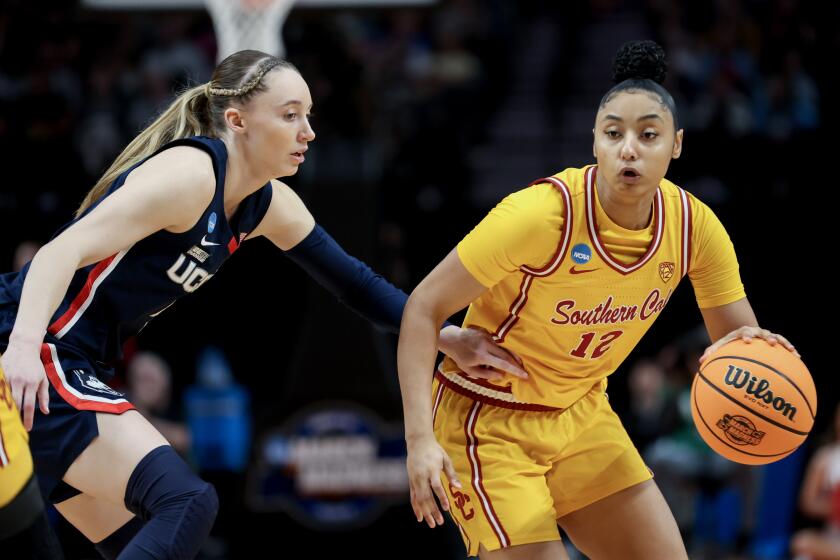Glasnost Bowl Is Canceled
USC’s football team won’t be taking two trips to Moscow next season.
The Glasnost Bowl, involving USC and Illinois Sept. 2 at Dynamo Stadium in the Soviet Union, was canceled Thursday.
So, the Trojans will have to settle for a trip to Moscow, Ida., where they will stay before their game Sept. 30 against Washington State in nearby Pullman, Wash.
Raycom, a television syndicator and the organizer of the game, announced the cancellation Thursday, citing inadequate facilities, accommodations and transportation.
USC still will play Illinois, however, at the Coliseum in early September, the exact date to be determined. USC now has seven home games, including three with nonconference opponents--Illinois, Utah State on Sept. 16 and Ohio State on Sept. 23. Previously, USC had dropped a season-opening game at Kansas to play in the Glasnost Bowl.
Athletic Director Mike McGee said that when the Glasnost Bowl game was contracted, the Coliseum had been established as a possible alternate site, or USC would not have participated.
McGee and Coach Larry Smith expressed disappointment that what was to have been the first American college football game in the Soviet Union wouldn’t take place as planned.
Said Smith: “Our players and coaches were looking forward to the game. It would have been a historic occasion. But what the heck. Nothing ventured, nothing gained.”
McGee said that Raycom was told by Soviet authorities last month that it could not assure the hotel rooms agreed upon and asked for a delay in negotiations.
“There were increasing problems in three areas: Where the rooms would be and how many, local transportation and the renovation of the stadium required for the game,” McGee said.
“(The Soviets) were looking at a fraction of the number of rooms called for. They also were not in the hotels that were indicated. And they were asking for certain charges that weren’t part of the contract.
“Increasingly, Raycom was looking at problems and huge losses. Both USC and Illinois were urging them to hang in there. We were looking at (today) as a go, no-go date. The Soviets wanted to delay on the contractual obligations, and Raycom pulled the plug.”
McGee and Smith visited the Soviet Union early last month, and McGee said that the problems seemed solvable at the time.
Arrangements had already been made for meat and poultry to be sent to the Soviet Union for the team, and a chef had already been hired. There was also a problem with refrigeration, but USC had planned to take its own equipment.
In promoting the Glasnost Bowl, Raycom offered travel packages to alumni and fans of USC and Illinois. Raycom officials said they would return travel deposits, with interest, to those fans who had made arrangements to go to Moscow.
More to Read
Go beyond the scoreboard
Get the latest on L.A.'s teams in the daily Sports Report newsletter.
You may occasionally receive promotional content from the Los Angeles Times.






